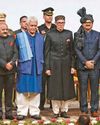India-Nepal ties had hit a nadir. It’s up to Nepal’s visiting PM, Prachanda, to restore them to an assured ease.

SINO-Indian rivalry in Nepal may no longer be a viable option for either of the two Asian giants or the leadership in Kathmandu. But Beijing seems hell-bent in fighting for its corner, particularly the gains it made in the Himalayan kingdom in the past year or so, to ensure they are not frittered away by Nepalese leaders in their bid to move close to New Delhi.
To keep up this pressure, Chinese president Xi Jinping’s scheduled visit to Nepal, scheduled for the end of October, now seems to be in jeopardy. Though it has not been called off yet, observers in Nepal say there is now a big question mark over it. But his planned visit to Dhaka next month, around the time of his India visit mid-October for the BRICS summit, is still on.
Though China believes India can play a major role in Nepal’s stability, it does not want to get marginalised in the process. It has already signed a transit agreement with Nepal and wants to ensure the Nepalese leadership, despite frequent changes in the government, should not renege on the commitment made by former PM K.P. Sharma ‘Oli’ on the one-belt one-road project and the infrastructure network linked to it.
India has traditionally loomed larger than any other country on the Nepalese political radar. Most Nepalese politicians, while describing Indo-Nepal ties, would run through the entire gamut of commonalities that bind the two countries together. The long, open border, the shared history, tradition, religion, ethnicity, language etc are all cited as essential elements that define this unique relationship.
Besides, India runs a series of development programmes and gives millions of dollars in aide and other assistance to prop Nepal’s economy and, as part of the 1950 Treaty of Friendship between the two sides, plays host to over eight million Nepalese.
この記事は Outlook の September 19, 2016 版に掲載されています。
7 日間の Magzter GOLD 無料トライアルを開始して、何千もの厳選されたプレミアム ストーリー、9,000 以上の雑誌や新聞にアクセスしてください。
すでに購読者です ? サインイン
この記事は Outlook の September 19, 2016 版に掲載されています。
7 日間の Magzter GOLD 無料トライアルを開始して、何千もの厳選されたプレミアム ストーリー、9,000 以上の雑誌や新聞にアクセスしてください。
すでに購読者です? サインイン

Wah, Taj
Armed with the steely spirit of Tajness’, the staff members at Taj Hotel in Mumbai put themselves in the line of fire to save the lives of the guests on 26/11

Exciting Breakthroughs in Breast Cancer Treatment
In this interview, Dr. Kanchan Kaur discusses advancements in Indian healthcare, the rise of women in medicine, and critical insights on breast cancer treatment and awareness

Ratan, Ta-ta
Many in the Indian industry think they have lost a moral compass in the passing of Tata

Plutarch's Mine of Poetry
Poet, writer and former IPS officer Keki N. Daruwalla has left behind a towering literary legacy

The Memory Keeper
Much of Han Kang's fiction traces the impact of the violence inflicted on ordinary lives by authoritarians and the burden of historical traumas

A Ploy for Self-Coronation
The ONOE proposal to synchronise elections puts the dynamic democratic process at risk

Time to Abrogate Bitterness
The National Conference's win in the recent assembly elections is a mandate for transformation, not celebration

'We Lose Our House Every Day'
With nearly one in every 100 people in India living under the threat of eviction, the weight of anxiety, fear and confusion has become an inescapable reality

THE PROMISE OF INDIAN MANAGEMENT EDUCATION IN CONTEMPORARY TIMES
The question of whether ‘politics informs economics’ or vice-versa has been looming large for decades now, but has hardly been as prominent and critical as today.

SHAPING TOMORROW'S LEADERS
The Power, Challenges, and Future of Business Schools in India and Beyond